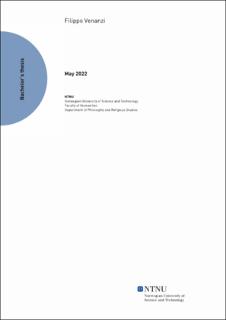| dc.contributor.advisor | Finke, Ståle | |
| dc.contributor.author | Venanzi, Filippo | |
| dc.date.accessioned | 2022-06-30T17:19:15Z | |
| dc.date.available | 2022-06-30T17:19:15Z | |
| dc.date.issued | 2022 | |
| dc.identifier | no.ntnu:inspera:109143710:64611943 | |
| dc.identifier.uri | https://hdl.handle.net/11250/3001843 | |
| dc.description.abstract | Ifølge Sartre finnes det en grunnleggende kløft mellom bevissthet og væren. Dette gjør det umulig for ham å finne en berettigelse for meningen bevissthet gir til sin eksistens. Grunnen til denne umuligheten kommer til å bli avdekket, i lys av Merleau-Pontys kritikk av Sartres negativitesfilosofi, i en mangel på passivitet. Sartre klarer ikke å gjøre rede for verdens fundamentale, allerede til stede meningsfullhet. Med støtte i Arendts lignende tanker om dette, blir det avslørt at ifølge Merleau-Ponty en berettigelse for meningsfull erfaring kan bli funnet, selv om ikke apodiktisk, i en pragmatisk dialektikk mellom menneske og verden. Dette forutsetter en tilgrunnliggende og allmennmenneskelig akseptert tillit til verdens realitet. Opphavet for denne todelingen av oppfatninger stammer fra to ulike syn på hva meningsfull erfaring er, som i sin tur må spores tilbake til mer grunnleggende ontologiske forskjeller mellom filosofene som tas i betraktning, som også blir undersøkt. | |
| dc.description.abstract | According to Sartre there is a fundamental dehiscence between consciousness and being. This makes it impossible for him to find a justification for the meaning consciousness gives to its existence. The reason for this will be found, in view of Merleau-Ponty's critique of Sartre's philosophy of negativity, in a lack of passivity. Sartre is not able to account for the fundamental, already-present meaningfulness of the world. Corroborated by Arendt's similar views on the matter, it is uncovered that for Merleau-Ponty, a justification for meaningful experience can be found, though not apodictically, in a pragmatic, ambiguous dialectic between man and world. This presupposes a belief and trust in the world that is commonly shared among men. The origin of this division of views is to be found in two different conceptions of what meaningful experience is, which in turn have to be traced back to more fundamental ontological differences between the philosphers in question, differences that are also explored. | |
| dc.language | eng | |
| dc.publisher | NTNU | |
| dc.title | Sartre, Merleau-Ponty and Arendt on Meaning and Justification | |
| dc.type | Bachelor thesis | |
